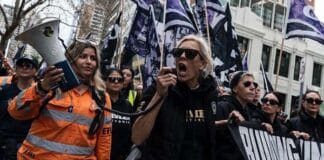If Bob Hawke’s death helps Labor win against Scott Morrison, it may well be Hawke’s finest moment.
There is a reason that the Murdoch Press have openly lauded the Labor governments of Hawke and Keating over the past few months: Hawke was Australia’s Margaret Thatcher. Hawke’s “economic rationalism” was an early version of what is now known, and condemned, as “neo-liberalism.”
His government imposed drastic wage cuts and forced through privatisation (of Qantas and the Commonwealth Bank, for starters) and tax cuts for the rich. Hawke massively shifted the economy in favour of the bosses, boosting the profits of big business. Along with the connivance of most union officials of the day, Hawke introduced the Prices and Incomes Accord, which imposed savage wage cuts far more effectively than any Liberal government could have done.
By the time Labor lost office in 1996, the average factory worker had lost $100 a week in pay in real terms, and full-time workers were putting in two hours longer a week at work. Over the same period corporate tax was slashed by 16 per cent from 49 percent to 33 percent.
And unions that opposed the wage-cutting Accord were savagely attacked. When the Builders Labourer’s Federation (BLF) tried to break the Accord straitjacket, the Hawke government permanently deregistered the union in 1986, and collaborated with the bosses to drive the union out of the construction industry.
In 1989, Hawke used the RAAF to break the pilots’ strike, when they attempted to get a wage rise outside the limits of the Accord.
Even before entering parliament, Bob Hawke had a bad reputation as head of the ACTU. He was known as “The Fireman” because of his role in ending strikes and hosing down disputes. Hawke took over as ACTU President in 1969, the year of the general strike to free jailed union official Clarrie O’Shea. Although rank and file struggle was on the rise, Hawke wanted to hold them back; his first loyalty was to Australian capitalism.
When Gough Whitlam was sacked as Prime Minister in 1975, workers spontaneously walked off the job around the country. But Hawke told them to go back to work, saying “don’t strike, donate a day’s pay” to Labor’s election campaign. With workers demobilised, Labor lost the election to Malcolm Fraser.
Hawke has been lauded as introducing Medicare, but the story is more complicated. Medibank had been introduced by the Whitlam government. After his sacking by the governor general in 1975, Malcolm Fraser’s Liberal government began dismantling the universal health scheme. Angry mass meetings of rank and file unionists pushed for Australia’s first general strike in July 1976 to save Medibank. True to his reputation, Hawke spent the day playing tennis. What could have been a major victory over the Liberals was turned into a defeat that allowed Fraser to dismantle Medibank as a universal health care system.
As Prime Minister, Hawke re-introduced Medibank, now called Medicare, in 1984.
In 1983, in the lead up to his election, Hawke had promised Aboriginal people national land rights legislation, but backed down rather than challenge the mining companies and the Burke Labor government in Western Australia in 1984. Bob Hawke attended the Barunga festival in the Northern Territory in June 1988 and promised a treaty with Aboriginal people by 1990. But that promise was discarded as quickly as the promise for national land rights.
Late in his life he was a strident advocate for establishing an international nuclear waste dump on Aboriginal land “to solve Indigenous poverty”.
In 1989, the Hawke Labor Government overturned Whitlam’s system of free tertiary education and began gradually re-introducing university fees.
Hawke’s loyalty to capitalism has never dimmed. As recently as 2014, as the union movement and community groups desperately struggled against Tony Abbott’s savage budget cuts, Hawke (and Keating) shamefully urged the Abbott government to slash spending and speedily repair the budget, boasting that they had made cuts worth $30 billion in 1986.
Hawke was also a loyal supporter of US power, offering regular briefings to the US embassy on his Labor colleagues during the period of the Whitlam government. He was also stridently pro-Israel, even calling for the use of nuclear weapons in the event of war with Arab governments.
Bob Hawke took Australia into the First Gulf War and the invasion of Iraq alongside the US in 1990. He even bragged about his personal relationship with George Bush Snr and playing a role in getting Canada to commit to the war as well.
The tributes have celebrated Hawke as a man who brought unions and business together, and introduced reforms that ensured Australia’s prosperity. But the Accord was a blatant wage-cutting exercise. Hawke shackled the unions while his reforms boosted corporate profits. The Hawke Labor government was no friend of the workers.
The floating of the dollar, financial deregulation, privatisation and labour market deregulation dramatically shifted wealth away from workers in favour of big business. This set the scene for subsequent Labor governments’ slavish embrace of the market.
Every unionist wants to see the end of the Morrison government. There are union gatherings on the eve of the election to celebrate Hawke. But Hawke spent his life upholding capitalism and holding back workers struggle—that’s nothing to celebrate. The Hawke government is a warning of just how much Labor is committed to running capitalism. As much as we want to see a Shorten Labor government emerge victorious from the 18 May federal election, we will need a different kind of politics if there is going to be a real fight against the inequality that is intrinsic to the capitalist system.
The power to change the system still lies with the workers who walked off the job against Fraser and the builder’s labourers and the unionists who fought against de-registration. In the 1980s, handfuls of socialists opposed Hawke’s Accord and the enterprise bargaining system that it led to. Now tens of thousands understand that the system is broken.
We will celebrate the end of Scott Morrison. But the more Shorten looks to Hawke as a model for change, the more we will need to look beyond Labor’s blinkers.
By Ian Rintoul





